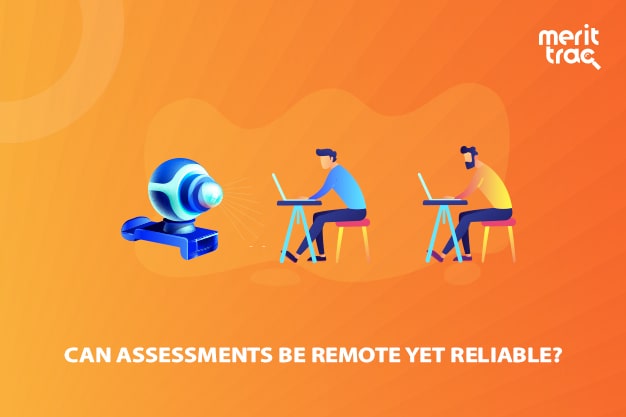
Can Assessments be Remote yet Reliable?
Date: 06/10/2020 | Posted by: Ajmal V | Category: Assessment , Examination , Government , Education , Online Examination
As the COVID-19 pandemic engulfs the entire world, the education system was forced to rely on technology to continue the learning and academic activities. Since the institutions remain closed for over six months now, the future of students seemed in uncertainty and the exams needed to be conducted anyhow. The UGC finally gave its nod to universities to conduct exams even in a remote mode.
To effectively administer the exam amid health safety concerns, remote examinations became a reliable solution. A panel discussion was conducted by MeritTrac on September 11th with some of the industry experts to analyse whether assessments can be remote yet reliable.
Skill of the future
The panel discussion started with the topic – skills of the future. Broadly, the skills can be classified into three - domain-based, soft skills, and high-order skills. According to Mr. Naveen Mittal, Commissioner of Telangana Higher Education, the skills of the future are - critical thinking, problem solving, agility and continuous learning. Artificial intelligence or machine-based learning, robotics, automation, creativity and innovation are also some of the sought after skills by employers nowadays.
Since we are undergoing very critical times, the future is going to become more volatile and competitive. Therefore, the organisations need talent to be equipped with competencies to face the opportunities and challenges.
The government sector also witnesses changes in terms of skills demand. Domain-based and soft skills are pivotal for government employees. Going forward, digital literacy is very important for hiring in government jobs, said Dr Udaya Bhaskar, Chairman of Andhra Pradesh Public Service Commission.
Changing face of examinations and assessments
Moving to examinations and assessment topic, the changes have already occurred in the education system and in administering examinations in the institutions. The COVID-19 outbreak has directly affected the process of conducting examinations especially in the educational institutions and for government recruitment. Initially, exams need to be adjourned, later remote examinations were introduced in the form of open-book exam and remote proctoring.
Prof. Balvinder Shukla, Vice Chancellor of Amity University explained that though the universities are adopting technology for the last couple of years, this much of disruption was never expected so soon, that too happened towards the end of the academic session. Instead of testing the knowledge of students, in the digital mode, it is important to look at the higher order of the learning.
“We conducted open-book examinations and allowed students to gather information from anywhere. While conducting exams remotely, we experienced some challenges. Students in remote areas were unable to upload the scanned answer scripts due to low connectivity. So, the institutions extended supported the students by enabling such students to submit the answer scripts through email,” added Prof. Shukla. She added that supplemented with improvement and support from the university, the online examination was most reliable.
The entire structure of institutions is changing thanks to COVID-19 pandemic, now everything in the education system is being measured based on outcome and output.
Dr. Sandeep Sancheti, Vice Chancellor, SRM University talked about the upcoming trends in the examination following the crisis. Continuous internal examinations give better opportunities and results, while anytime, anywhere examination was realized through online mode, where virtual tools play a crucial role and many elements are yet to be explored. Group evaluation is a new concept and institutions in India have never done it so far. The on-demand examination is an in-thing and it is conducted whenever the learners are ready for an exam. Examination cafeacute; is another new concept, that is third party run examination centres in different geographies and enables the institutions to conduct tests for its students spread across the locations.
Possibility of remote proctored NEET & JEE exams
Technology is reliable to conduct high stake exams these days. Remote assessments to fraud detection, technology can do it all. But the issue is whether India is ready to accept these technological changes and remote assessments.
According to Naveen Mittal, every largescale examination including NEET and JEE will move to online mode in near future. “Reliability-wise and technology-wise we are ready; the only question is when,” he said.
“This year, we are responding to a pandemic. We cannot suddenly move everything for that sake. We need to have a proper plan to move such examination more sustainably,” added Mittal.
“Public acceptability is a major concern to transform large-scale government examinations into an online remote proctoring mode examination. We need to convince all the stakeholders on reliability, security and transparency of the exams,” opined Dr Udaya Bhaskar.
“Another problem is the connectivity and bandwidth, especially in remote areas. The pandemic has shown us that we need to focus on these two areas. Only if that issue is addressed, no matter technology or acceptance, the online examination is completely feasible,” argued Balvinder Shukla.
“All the anomalies, we are facing in conducting examinations exist in technology-driven exams as well. It will improve only if the mindset is improved,” said Dr. Sandeep Sancheti. He added that technology is far ahead than the normal exam in fraud detection. It records every activity in the exam and can be used for further steps, unlike the traditional system. The remote proctored exams also reduce the time wastage aspect of invigilators, in most cases teachers.
Unification of exams
National Testing Agency (NTA) is emerging as an agency to control examinations pan India by unifying exams and launching common admission tests across the country. National Education Policy 2020 (NEP) has envisioned such a transformation in the coming years. The question here is will this be effective?
“In general purposes, such as conducting exams in largescale, the NTA is useful, but for specific needs or just for one university, NTA may not be a good option,” said Dr. Balvinder Shukla.
Role of MeritTrac
Digital learning, teaching, assessment, and evaluation are here to stay. Adoption of digital examination and evaluation is high and private or public institutions are progressive enough to change accordingly. Ambrish Sinha, CEO of MeritTrac, explained further that though the technology like remote proctoring is there for years, the pandemic has fast-forwarded it. Along with AI, the remote proctoring system can further be enhanced by a live proctor to improve effectiveness and reliability.
“We are prepared to conduct high-stake examinations. We have conducted examinations for some of the leading institutions. Yes, there needs to be advancement at the technology-end, and we need to streamline the processes to make it more student friendly. In fact, we expect that even afternormalcy is returned, the nature of examination would be a blended mode instead of a paper-pen mode and we are prepared for that,” opined Ambrish Sinha.
“Given the public acceptability and change in societal behaviour, in the longer run, the government recruitment tests can also be done through remote proctored mode,” added Mr. Sinha.
The panel discussion was moderated by Tanya Tikoo, editor-in-chief of Observe Now and all in all it was a very engaging and futuristic discussion.












 Sales Hotline: USA: +1 646 916 0939 / Others: +91 80619 14700
Sales Hotline: USA: +1 646 916 0939 / Others: +91 80619 14700


